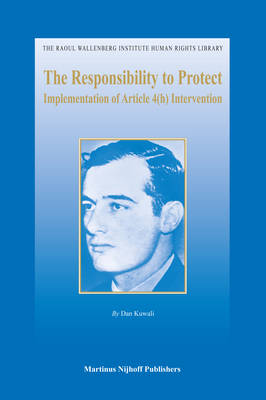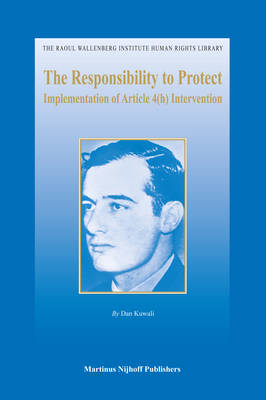
Je cadeautjes zeker op tijd in huis hebben voor de feestdagen? Kom langs in onze winkels en vind het perfecte geschenk!
- Afhalen na 1 uur in een winkel met voorraad
- Gratis thuislevering in België vanaf € 30
- Ruim aanbod met 7 miljoen producten
Je cadeautjes zeker op tijd in huis hebben voor de feestdagen? Kom langs in onze winkels en vind het perfecte geschenk!
- Afhalen na 1 uur in een winkel met voorraad
- Gratis thuislevering in België vanaf € 30
- Ruim aanbod met 7 miljoen producten
Zoeken
€ 381,95
+ 763 punten
Omschrijving
This book explores the scope and limits of Article 4(h) of the African Union Constitutive Act (AU Act). The goal is to generate new thinking on, and contribute a fresh legal approach to, the implementation of the right to intervene under Article 4 (h) of the AU Act in the face of war crimes, genocide and crimes against humanity.
The AU right to intervene, though noble in purpose, is problematic to implement owing to the inherently political matrix of intervention and the question of measures for intervention which have usually been reactive. This book seeks to investigate the scope and validity of the AU's treaty-based right to intervene as an exception to the principle of State sovereignty. Central to the inquiry is the argument that the UN Charter does not expressis verbis provide for enforcement by consent by regional organisations; equally the UN Charter does not specifically outlaw enforcement action by consent by regional organisations. The book examines whether there is any legal basis for forcible military intervention to prevent serious human rights violations that constitute serious crimes under international law; and if yes, when and how? The discussion involves a legal analysis of the rules that ought to apply in the implementation of Article 4(h) intervention in international law.
By examining the rationale and applicability of the right to intervene, the book intends to promote the development of consistent legal approaches for effective intervention within the AU human security architecture. More particularly, rather than focusing on intervention, the book intends to inculcate a culture of prevention and compliance within the framework of the AU.
The AU right to intervene, though noble in purpose, is problematic to implement owing to the inherently political matrix of intervention and the question of measures for intervention which have usually been reactive. This book seeks to investigate the scope and validity of the AU's treaty-based right to intervene as an exception to the principle of State sovereignty. Central to the inquiry is the argument that the UN Charter does not expressis verbis provide for enforcement by consent by regional organisations; equally the UN Charter does not specifically outlaw enforcement action by consent by regional organisations. The book examines whether there is any legal basis for forcible military intervention to prevent serious human rights violations that constitute serious crimes under international law; and if yes, when and how? The discussion involves a legal analysis of the rules that ought to apply in the implementation of Article 4(h) intervention in international law.
By examining the rationale and applicability of the right to intervene, the book intends to promote the development of consistent legal approaches for effective intervention within the AU human security architecture. More particularly, rather than focusing on intervention, the book intends to inculcate a culture of prevention and compliance within the framework of the AU.
Specificaties
Betrokkenen
- Auteur(s):
- Uitgeverij:
Inhoud
- Aantal bladzijden:
- 552
- Taal:
- Engels
- Reeks:
- Reeksnummer:
- nr. 37
Eigenschappen
- Productcode (EAN):
- 9789004191716
- Verschijningsdatum:
- 10/12/2010
- Uitvoering:
- Hardcover
- Formaat:
- Genaaid
- Afmetingen:
- 160 mm x 240 mm
- Gewicht:
- 1097 g

Alleen bij Standaard Boekhandel
+ 763 punten op je klantenkaart van Standaard Boekhandel
Beoordelingen
We publiceren alleen reviews die voldoen aan de voorwaarden voor reviews. Bekijk onze voorwaarden voor reviews.









